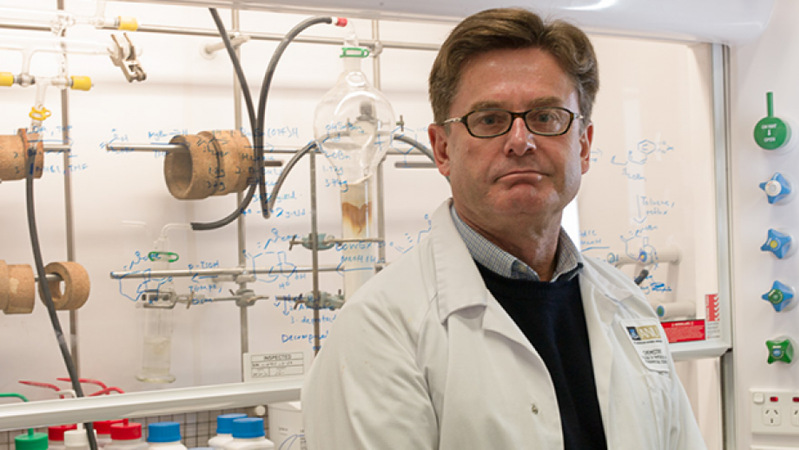Science as a Bridge to Benefit Global Well-being
2022-03-26
Martin Banwell, a world- renowned Australian scientist, amassed a lengthy list of honors during his academic career in the field of organic chemistry. He became a fellow of the Australian Academy of Science in 2004 and joined Jinan University (JNU) as a full- time professor at the end of 2019, before being appointed the first dean of the Institute of Advanced and Applied Chemistry Synthesis (IAACS).
Professor Banwell was presented with the 2021 Chinese Government's Friendship Award in recognition of his
significant contributions to China's modernization and cooperation with other countries.

Professor Martin Banwell. (COURTESY PHOTO)
Competitive academic environment
Banwell described China's academic environment as being dynamic, competitive and stimulating. China's support of a broad range of scientific research, coupled with a sizable chemical industry, went a long way to convince him to further his academic research in the country.
I feel as though China is a major focal point of research in chemistry in the world these days, he said. He is appreciative of the opportunities JNU has provided him and said, The combination of all these possibilities makes life attractive here. He also praised his colleagues at JNU for laying the groundwork for his research work.
In addition, Banwell noted that China is becoming more concerned with using the powerful tools of organic chemistry to tackle with global warming and other major environmental issues.
He emphasized the critical role of green chemistry in fostering an economically and environmentally sustainable future. In terms of commercializing scientific discoveries in the chemistry field, Banwell noted that Guangdong province benefits from its strong chemical industry and the strong emphasis placed on
translating interesting research results in the laboratory into commercial products.
He also noted that failure is actually part of the landscape progress. We should always prepare to encounter failures and interpret or exploit them properly so that we eventually achieve our goals, he said, adding that the most crucial ingredients for translating university achievements into commercial products and processes are funding (for research) and perseverance.
China has numerous successful examples and astounding accomplishments in research and innovation, he said, sounding distinctly optimistic about China's innovation ecosystem.
Banwell believes that the IAACS has a long-term role to play by continuing to develop its ongoing research program and so addressing all sorts of interesting new problems (and opportunities) emerging in an increasingly complex world. According to him, research is an ongoing and never- ending mission.
Cooperation to make a difference
Despite the current geopolitical complexities and the challenges presented by COVID-19, Banwell says there will always be fundamental value in international scientific exchanges because this can promote global well- being, emphasizing that, Scientific knowledge is like water, it flows everywhere.Based on his experience, concerted efforts are essential for increasing the body of knowledge and identifying important discoveries going forward.
According to Banwell, the IAACS maintains active contact with research groups in Australia, Brazil, France, the U.S. and U.K. We hope that outstanding experts in chemistry from other countries will visit China in the not- too- distant future and so enhancing already fruitful academic exchanges. Their work on drug development and green chemistry complements ours extremely well, he said, clearly pushing the need for cooperation.
Banwell anticipated that joint actions and chemistry with international peers would result in exciting new discoveries and developments, noting that international exchanges are critical while also expressing hope they continue to thrive.
He applauded China's readiness to welcome increasing numbers of foreign experts to conduct research as well as advance technological development and so resulting in the generation of greater global research resources. Creating winwin arrangements between China and the rest of the world must be the approach that is adopted.
As to the sci- tech collaboration between China and Australia, he said, I think science is an excellent way of building bridges between China and Australia. I think there are numerous possibilities in that respect, and I am hoping to play a role as a bridge between the two countries with the advantage of knowing both well.
Banwell is also looking forward to resuming international travel in order to conduct more in-depth and face- to- facecommunications among sci- tech professionals.


